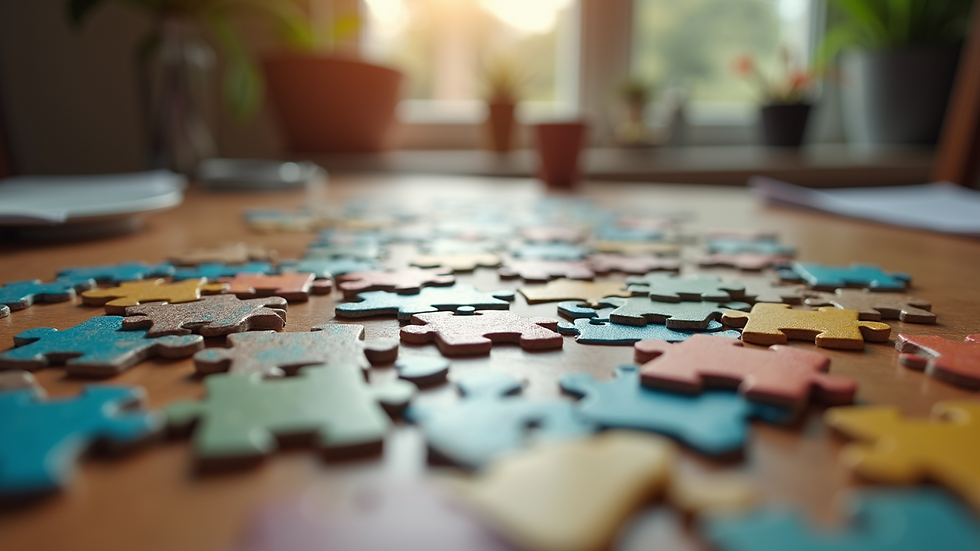The Benefits of Completing Crossword Puzzles
- lslatt20001
- Nov 3
- 3 min read
Crossword puzzles have been a popular pastime for decades, enjoyed by people of all ages. Beyond being a fun challenge, completing crossword puzzles offers a variety of benefits that can improve mental health, cognitive skills, and even social connections. This post explores why spending time on crossword puzzles is more than just entertainment—it’s a valuable activity for your brain and well-being.

How Crossword Puzzles Boost Brain Function
Crossword puzzles engage multiple areas of the brain simultaneously. When you solve clues, you use language skills, memory recall, and problem-solving abilities all at once. This mental workout helps keep the brain sharp.
Improves vocabulary and language skills
Crossword puzzles expose you to new words and phrases. Encountering unfamiliar terms encourages you to learn and remember them, expanding your vocabulary over time.
Enhances memory
Remembering clues and answers exercises your short-term and long-term memory. This can help improve recall in daily life.
Strengthens problem-solving skills
Figuring out tricky clues requires logical thinking and pattern recognition. This sharpens your ability to analyze problems and find solutions quickly.
Supports mental agility
Regularly challenging your brain with puzzles keeps it flexible and responsive, which may help delay cognitive decline as you age.
Mental Health Benefits of Crossword Puzzles
Beyond cognitive improvements, crossword puzzles can positively affect your emotional well-being.
Reduces stress
Focusing on a puzzle can act as a form of mindfulness, helping you tune out worries and relax. The sense of accomplishment from completing a puzzle also boosts mood.
Provides a sense of achievement
Completing a crossword puzzle, especially a difficult one, gives a rewarding feeling that can increase confidence and motivation.
Encourages patience and persistence
Puzzles often require time and effort to solve. This builds patience and teaches you to keep trying even when faced with challenges.
Crossword Puzzles and Social Interaction
While often seen as a solo activity, crossword puzzles can also foster social connections.
Shared activity with friends and family
Working on puzzles together encourages conversation and teamwork. It’s a great way to bond and share knowledge.
Community engagement
Many newspapers and websites host crossword clubs or competitions. Joining these groups connects you with others who share your interest.
Intergenerational interaction
Crossword puzzles can bridge age gaps, allowing younger and older family members to collaborate and learn from each other.
Practical Ways to Incorporate Crossword Puzzles into Your Routine
Adding crossword puzzles to your daily or weekly schedule is simple and rewarding. Here are some tips to get started:
Start with easier puzzles
Choose puzzles that match your skill level to avoid frustration and build confidence.
Set aside dedicated time
Even 10 to 15 minutes a day can provide benefits without feeling overwhelming.
Use a variety of sources
Try puzzles from newspapers, books, or apps to keep things interesting and expose yourself to different styles.
Challenge yourself gradually
As you improve, move on to more difficult puzzles to keep your brain engaged.
Make it social
Invite friends or family to solve puzzles together or discuss clues.
Real-Life Examples of Crossword Puzzle Benefits
Many people have shared how crossword puzzles have helped them in practical ways:
A retired teacher noticed improved memory and sharper thinking after regularly completing puzzles.
A college student used crossword puzzles to expand vocabulary and perform better in language classes.
An older adult found that puzzles helped maintain mental clarity and provided a relaxing daily routine.
These stories highlight how crossword puzzles can fit into different lifestyles and goals.
Crossword Puzzles as a Tool for Lifelong Learning
Crossword puzzles encourage curiosity and continuous learning. They often include clues about history, geography, science, and culture, making them a fun way to discover new facts.
Expands general knowledge
Encountering diverse topics in puzzles broadens your understanding of the world.
Encourages research
When you don’t know an answer, looking it up can lead to deeper learning.
Supports language learning
For those studying a new language, puzzles can reinforce vocabulary and grammar.
Tips for Maximizing the Benefits of Crossword Puzzles
To get the most out of crossword puzzles, consider these strategies:
Avoid rushing
Take your time to think through clues carefully for better mental exercise.
Use a pencil
This allows you to make changes and encourages trial and error, which is part of learning.
Review completed puzzles
Look back at tricky clues to reinforce learning and improve future performance.
Combine with other brain activities
Include reading, memory games, or math puzzles for a well-rounded mental workout.
Final Thoughts on Crossword Puzzles
Crossword puzzles offer more than just a way to pass time. They provide a meaningful challenge that improves brain function, supports mental health, and encourages social interaction. Whether you are young or old, a beginner or an expert, integrating crossword puzzles into your routine can bring lasting benefits.
Try starting with a simple puzzle today and see how it sharpens your mind and brightens your day. Keep challenging yourself and enjoy the journey of learning and discovery that crossword puzzles provide.


Comments